孔子 儒家の始祖 『論語』の智慧 諸国巡遊と逸話 現代的影響力
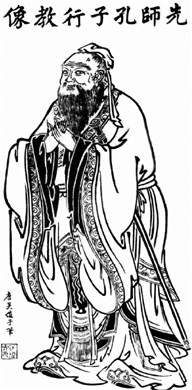
Confucius: Founding Father of Confucianism, Wisdom from “The Analects,” Travels and Anecdotes Across Nations, Contemporary Influence
イントロダクション
孔子は儒家思想の始祖であり、その教えは今も多くの人々に影響を与え続けています。
『論語』に込められた智慧は、人生の指針として受け継がれ、孔子自身の諸国巡遊や逸話には、彼の思想や人柄を窺い知るヒントがたくさん隠されているんです。
現代社会においても、孔子の教えは価値ある洞察を提供し、多くの人々の心に響いています。
この記事では、孔子とその教えが持つ普遍的な魅力と現代における影響力について探っていきましょう。
Introduction
Confucius, the founding father of Confucianism, continues to exert profound influence on countless individuals to this day.
The wisdom embedded in “The Analects” has been passed down as a guiding principle for life, while Confucius’ travels across various states and his anecdotes offer insights into his thoughts and character.
Even in modern society, Confucius’ teachings provide valuable insights that resonate deeply within many people.
In this article, let’s delve into the timeless appeal of Confucius and the enduring impact of his teachings in the contemporary world.

Confucius
孔子の生涯と儒家の誕生
孔子は紀元前551年、中国の魯国に生まれました。
彼は中国の思想家であり、儒家の始祖とされています。
孔子の教えは後の四聖人(四聖)に大きな影響を与え、中国文化に深く根ざすものとなりました。
彼の思想は『論語』に集約され、後世に伝えられています。
孔子は諸国巡遊の旅を行い、様々な国で教えを説きましたが、理想の政を実現することはできませんでした。
晩年には『春秋』の編纂に尽力し、74歳でこの世を去りました。
孔子の逸話は今も多くの人々に語り継がれており、彼の教えは諸子百家の中でも特に重要な位置を占めています。
孔子:中国の思想家、儒家の始祖、魯国に生まれる
孔子は紀元前551年、現在の山東省曲阜市にあたる魯国で生まれました。
彼は中国史上最も影響力のある思想家の一人であり、儒家の始祖として知られています。
釈迦、キリスト、ソクラテスと並び「四聖人」の一人に数えられ、その教えは後の世に大きな影響を与えました。
孔子の思想は、『論語』や『春秋』といった著作によって伝えられています。
彼は生涯を通じて、諸国巡遊の旅を行い、様々な地で教えを広めました。
孔子は74歳でこの世を去りましたが、その逸話や教えは現代にも引き継がれ、「諸子百家」の中でも特に尊敬されています。
儒家思想の核心:『論語』に見る生き方と倫理
儒家思想は、孔子によって約2500年前の魯国で生まれました。
彼は中国の思想家であり、儒家の始祖とされ、その教えは『論語』に集約されています。
孔子は、人々が道徳的な生き方をすることを重んじ、礼儀や倫理を社会の基盤と考えました。
四聖人の一人として尊敬され、その影響は後世に大きく波及しています。
孔子は、諸国巡遊の旅を経て、74歳で没しましたが、その逸話や教えは『春秋』などの著作を通じて今もなお多くの人々に読まれ続けています。
『論語』は、儒家思想の核心をなす書物であり、人間関係の在り方や倫理観について深い洞察を与えてくれます。
孔子とその思想は、諸子百家の中でも独特の位置を占め、現代においてもその価値は色褪せることがありません。
孔子の儒家の内容とは
背景: 中国の思想界に輝く星、儒教
儒教は、中国の思想界において最も著名な学派のひとつであり、その基礎を築いたのが孔子である。
孔子の儒家は、人間関係、社会秩序、そして政治のあり方に関する深い思索を含んでいる。
仁の概念: 人間関係の基本
孔子の儒教は、「仁(じん)」という概念を中心に据えている。
仁とは、他者への思いやりや情愛を指し、人間関係における倫理の基本とされる。
孔子は、仁を通じて人々が互いに尊重し合い、誠実に接することが重要であると説いた。
礼の重要性: 社会秩序の維持
また、孔子の儒教は、「礼(れい)」という概念も重視している。
礼は、社会的な規範やマナーを指し、人々が互いに敬意を払い、秩序を維持するための枠組みとして位置付けられる。
孔子は、礼を通じて個々の行動が社会全体に与える影響を強調し、個人の自律と社会の調和の両立を図った。
君臣の関係: 理想的な政治体制
孔子の儒教は、君臣の関係についても重要な考え方を提供している。
彼は、君主と臣下の間には信頼と忠誠が必要であり、また、君主は民衆に対して父親のように慈愛を示すべきであると説いた。
このような理念は、理想的な政治体制の確立を目指し、政治の倫理的な基盤を築くためのものである。
学問と修養: 人間の完成を目指して
最後に、孔子の儒教は学問と個人の修養にも大きな重点を置いている。
彼は、知識の追求と品行の修練を通じて、人間の完成を目指すことの重要性を説いた。
孔子は、人々が自己の欠点を克服し、より良い人間として成長するためには、絶えず学び続けることが必要であると信じていた。
結論
孔子の儒教は、仁や礼といった概念を通じて人間の内面や社会的な関係を深く探求し、理想的な政治体制や個人の修養についての指針を提供している。
彼の思想は、現代でも中国文化や社会において重要な影響力を持ち続けている。
Here are the English translations for the provided Japanese texts:
- Introduction Confucius: Life and the Birth of Confucianism Confucius was born in 551 B.C. in the State of Lu in China. He is revered as a Chinese philosopher and considered the founding figure of Confucianism. Confucius’ teachings had a profound influence on the later Four Sages (四聖) and deeply rooted in Chinese culture. His philosophy is encapsulated in “The Analects” and has been passed down through generations. Confucius traveled extensively among the states, preaching his teachings, although he did not realize his ideal governance. In his later years, he devoted himself to the compilation of “Spring and Autumn Annals” and passed away at the age of 74. Confucius’ anecdotes are still handed down to many people today, and his teachings hold a particularly important position among the “Hundred Schools of Thought.”
- Confucius: Founder of Confucianism, Born in the State of Lu Confucius was born in 551 B.C. in the State of Lu, which corresponds to present-day Qufu City, Shandong Province. He is one of the most influential philosophers in Chinese history and is known as the founder of Confucianism. Alongside Buddha, Christ, and Socrates, he is counted among the “Four Sages,” and his teachings had a significant impact on later generations. Confucius’ thoughts are transmitted through works such as “The Analects” and “Spring and Autumn Annals.” Throughout his life, he traveled among the states, spreading his teachings. Confucius passed away at the age of 74, but his anecdotes and teachings are still read by many people through works like “Spring and Autumn Annals.”
- The Core of Confucianism: Living and Ethics in “The Analects” Confucianism emerged approximately 2,500 years ago in the State of Lu, thanks to Confucius. He is regarded as a Chinese philosopher and the founding figure of Confucianism, and his teachings are encapsulated in “The Analects.” Confucius emphasized people’s moral ways of living, considering manners and ethics as the foundation of society. Respected as one of the Four Sages, his influence spread widely in subsequent generations. Through his travels among the states, Confucius passed away at the age of 74, but his anecdotes and teachings are still read by many people through works like “Spring and Autumn Annals.” “The Analects” is a fundamental text of Confucianism, providing deep insights into human relationships and ethical perspectives.
- Confucius and the Essence of Confucianism Background: A Star in the Chinese Intellectual World, Confucianism Confucianism is one of the most famous schools of thought in the Chinese intellectual world, established by Confucius. Confucius’ Confucianism contains deep reflections on human relationships, social order, and political governance. Concept of Benevolence (仁): Foundation of Human Relationships Confucius’ Confucianism centers on the concept of “benevolence (仁).” Benevolence refers to compassion and affection towards others, serving as the basis of ethics in human relationships. Confucius advocated that through benevolence, people should respect each other and interact sincerely. Importance of Ritual (礼): Maintenance of Social Order Moreover, Confucius’ Confucianism emphasizes the concept of “ritual (礼).” Ritual refers to social norms and manners, positioning them as frameworks for mutual respect and the maintenance of order. Confucius emphasized through ritual that individual actions have a significant impact on society as a whole, aiming to achieve both individual autonomy and social harmony. Relationship Between Ruler and Subject: Ideal Political System Confucius’ Confucianism also provides important insights into the relationship between ruler and subject. He emphasized the importance of trust and loyalty between ruler and subject, and the ruler should show affection to the people like a father. Such principles aim to establish an ideal political system and build ethical foundations for politics. Scholarship and Cultivation: Aim for Human Completion Lastly, Confucius’ Confucianism places great emphasis on scholarship and individual cultivation. He advocated the importance of pursuing knowledge and cultivating moral character to aim for human completion. Confucius believed that people need to continuously learn to overcome their shortcomings and grow into better individuals. Conclusion Confucius’ Confucianism deeply explores human inner aspects and social relationships through concepts like benevolence and ritual, providing guidelines for an ideal political system and individual cultivation. His teachings continue to exert significant influence in contemporary Chinese culture and society.
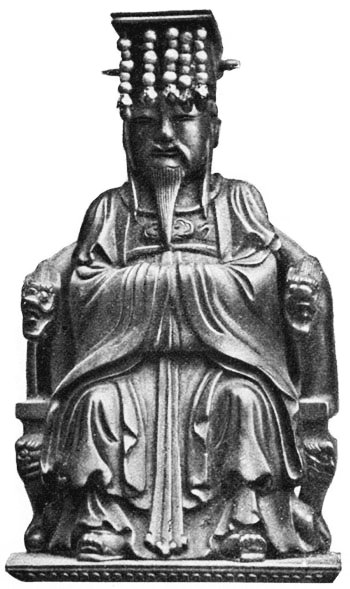
(Note: “孔夫子” (Kong Fuzi) is an honorific title used for Confucius in Chinese culture, often translated as “Master Kong” or “Confucius” in English.))
孔子の教えと四聖人(四聖)の役割
孔子は中国の思想家であり、儒家の始祖とされています。
魯国に生まれ、74歳で没した彼の一生は、『論語』や『春秋』によって後世に伝えられています。
孔子の教えは、個人の徳の向上と社会秩序の確立を重視しており、これが四聖人(四聖)の役割と密接に関わっています。
四聖人は、孔子の思想を継承し、それぞれが儒学の特定の側面を代表しています。
諸子百家の時代にあって、彼らの教えは多くの人々に影響を与え、中国の文化や政治に深い足跡を残しました。
孔子の諸国巡遊の旅は、その思想を広めるためのものであり、多くの逸話が残っています。
これらの教えは現代においても価値があり、人々の生き方や考え方に影響を与えています。
孔子と四聖人:儒教の基礎を築く
孔子は紀元前551年、中国の魯国に生まれた偉大な思想家です。
彼は儒家の始祖とされ、その教えは後の中国文化に大きな影響を与えました。
儒学では、孟子、荀子、曾子、顔回を四聖(四配)とし、これらの人物もまた儒教の発展に寄与した重要な人物です。
孔子は『論語』をはじめとする多くの著作を残し、倫理観や道徳、政治思想についての考えを広めました。
74歳で亡くなるまで、諸国巡遊の旅を行い、多くの逸話を残しています。
『春秋』は彼の政治的見解をまとめた作品であり、後世の人々に大きな影響を与えたことは言うまでもありません。
孔子と四聖人の教えは、諸子百家の中でも特に儒教の基礎を築き、中国の思想文化に不可欠な要素となっています。
儒家の五経と『春秋』:孔子の編纂とその意義
孔子は周末の魯国に生まれ、中国の思想家として、また儒家の始祖として知られています。
彼の生涯は、諸国巡遊の旅や諸子百家の中での活動に彩られ、74歳でこの世を去りました。
特に『論語』や『春秋』は、孔子の思想を後世に伝える重要な文献とされています。
『春秋』は、孔子が編纂したとされ、その時代の政治・社会状況を反映した記録であり、儒家の五経の一つに数えられます。
この作業を通じて、孔子は単に歴史を記録しただけでなく、理想的な君主と治世のあり方を示唆し、後の世に大きな影響を与えました。
四聖人の一人として尊敬される孔子の業績は、逸話を通しても語り継がれ、今日に至るまで中国文化や思想に深い痕跡を残しています。
『春秋』の内容
歴史と倫理の交錯
中国の古典『春秋』は、孔子の弟子たちによって編纂された歴史書であり、その内容は歴史のみならず、倫理や政治思想にも深い洞察を与える。
歴史の舞台
『春秋』は、紀元前722年から481年までの春秋時代を扱っており、その時代の政治的な変遷や国家間の対立を記録している。
これは、当時の諸侯国の出来事を年代記形式で記録したものである。
事件と人物
書中には、諸侯の戦いや同盟、国内政治の論争などが詳細に描かれている。
また、孔子自身の政治的な活動や彼が出会った人々も登場する。
これらの人物と出来事は、孔子の思想や教えをより深く理解する手掛かりとなる。
倫理と教訓
『春秋』は単なる歴史書にとどまらず、倫理的な教訓を提供する文学的な側面も持っている。
孔子の教えや道徳的な原則が、出来事や人物の描写を通じて明確に示されている。
このような教訓は、読者に道徳的な観点からの理解と考察を促す。
その意義と影響
『春秋』は、中国の古典文学の中でも特に重要な位置を占めている。
その記録は中国の歴史を理解するうえで貴重な資料であり、また、儒家思想の発展においても重要な基盤を提供している。
『春秋』の教訓は今日でも広く尊重され、多くの人々に影響を与え続けている。
結論
『春秋』は、中国の歴史と倫理の貴重な記録であり、孔子の思想や教えを理解するうえで欠かせない文献である。
その内容は歴史だけでなく、人間の行動や価値観についての深い洞察を提供しており、今日でもその影響力は衰えることがない。
Confucius’ Teachings and the Role of the Four Sages
Confucius, a Chinese philosopher, is revered as the founder of Confucianism.
Born in the state of Lu and passing away at 74, his life is preserved through works like the Analects and the Spring and Autumn Annals.
Confucius’ teachings emphasize personal virtue and the establishment of social order, closely tied to the roles of the Four Sages.
These Sages inherited Confucius’ philosophy, each representing specific aspects of Confucianism within the Hundred Schools of Thought.
During his travels across various states, Confucius spread his teachings, leaving behind many anecdotes.
These teachings remain relevant today, influencing people’s lives and perspectives.
Confucius and the Four Sages: Establishing the Foundations of Confucianism
Confucius, born in 551 BC in China’s Lu state, was a great thinker and is revered as the founder of Confucianism.
His teachings profoundly influenced later Chinese culture.
Among the Four Sages—Mencius, Xunzi, Zengzi, and Yan Hui—each made significant contributions to the development of Confucianism.
Confucius left behind numerous works, including the Analects, which spread his ethical and political philosophies.
Until his death at 74, Confucius traveled extensively, leaving behind many anecdotes.
The Spring and Autumn Annals, compiling his political views, profoundly impacted later generations.
Confucius and the Four Sages’ teachings laid the foundation for Confucianism within the Hundred Schools of Thought, marking essential elements in Chinese philosophical culture.
The Five Classics and the Spring and Autumn Annals: Compilation by Confucius and Its Significance
Born in Lu during the Zhou Dynasty, Confucius is renowned as a philosopher and the founder of Confucianism.
His life was marked by travels and activities among the Hundred Schools of Thought until his death at 74.
Especially revered are his works such as the Analects and the Spring and Autumn Annals, crucial texts for transmitting his philosophy to future generations.
The Spring and Autumn Annals, compiled by Confucius, is one of the Five Classics and reflects the political and social conditions of its time, serving as a record of historical events among feudal states.
Events and figures within the text include political disputes and encounters with people that offer insights into Confucius’ teachings and thoughts.
It also provides literary aspects by imparting ethical lessons and principles through its portrayal of events and characters, encouraging readers to consider moral perspectives.
The Spring and Autumn Annals hold a significant place in classical Chinese literature, offering valuable insights into understanding Chinese history and providing an important foundation for the development of Confucian thought.
Its moral teachings continue to be widely respected and continue to influence many people today.
Conclusion
The Spring and Autumn Annals is a valuable record of Chinese history and ethics, an essential document for understanding Confucius’ thoughts and teachings.
Beyond its historical content, it offers profound insights into human behavior and values, maintaining its influence unabated to this day.
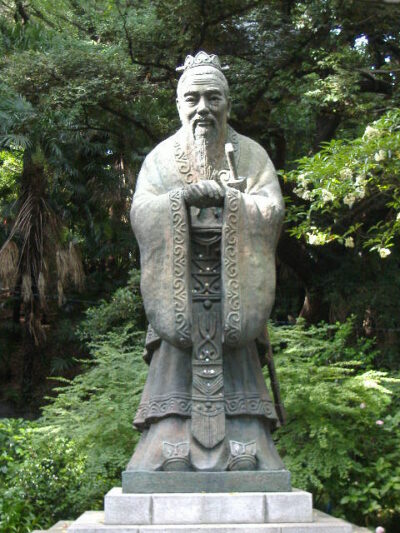
The Statue of Confucius
孔子の諸国巡遊の旅
孔子は、中国の思想家であり、儒家の始祖として知られています。
魯国に生まれ、生涯を通じて多くの弟子に影響を与えました。
彼の教えは『論語』に収められ、後世に大きな影響を及ぼしました。
孔子は四聖人の一人としても尊敬されています。
特に注目すべきは、孔子が行った諸国巡遊の旅です。
この旅では、多くの国を訪れ、時の君主たちに政治の道を説きました。
孔子の旅は、彼の思想が諸子百家の中で際立つきっかけとなりました。
彼は74歳で没しましたが、その生涯と逸話は今も多くの人々に語り継がれています。
『春秋』の編纂者としても知られ、その業績は中国文化において非常に重要な位置を占めています。
諸子百家の時代と孔子の諸国巡遊
諸子百家の時代、中国は思想の花開く春を迎えていました。
その中心にいたのが、儒家の始祖とされる孔子です。
魯国に生まれた孔子は、その生涯で『論語』や『春秋』といった著作を残し、後世に大きな影響を与えました。
特に注目すべきは、74歳で亡くなるまでの諸国巡遊の旅。
この旅は、四聖人(四聖)の一人として尊敬される孔子が、時の権力者にその思想を説き、弟子たちと共に学問を広めた歴史的な出来事です。
諸子百家の中でも孔子の影響は絶大で、彼の逸話は今も多くの人々に語り継がれています。
このように、孔子とその時代を知ることは、中国の思想史を理解する上で欠かせない要素と言えるでしょう。
孔子の思想の普及と影響力
孔子は中国の思想家であり、儒家の始祖として知られています。
周末期の魯国に生まれ、生涯にわたって「四聖人(四聖)」の一人として尊敬されてきました。
彼の考えは『論語』や『春秋』などの著作によって後世に伝えられ、諸子百家の中でも特に影響力がありました。
孔子は74歳で没するまで、諸国巡遊の旅をしながら、その教えを広めました。
彼の逸話は今も多くの人々に語り継がれ、中国だけでなく世界中にその思想の普及と影響力を広げています。
孔子の教えは、倫理観や道徳観において今日の社会にも大きな示唆を与えており、その智慧は時代を超えて受け継がれているのです。
The Travels of Confucius
Confucius is known as a Chinese philosopher and the founder of Confucianism.
Born in the state of Lu, he influenced many disciples throughout his life.
His teachings, compiled in the Analects, had a profound impact on later generations.
Confucius is revered as one of the Four Sages.
Particularly notable are his travels to various states, where he advised rulers on the principles of governance.
Confucius’ journey marked a significant moment in the prominence of his philosophy among the Hundred Schools of Thought.
Although he passed away at the age of 74, his life and anecdotes continue to be passed down through generations.
Known also as the compiler of the Spring and Autumn Annals, his contributions hold a pivotal place in Chinese culture.
The Era of the Hundred Schools of Thought and Confucius’ Travels
During the Era of the Hundred Schools of Thought, China experienced a flourishing of intellectual activity.
At its heart was Confucius, revered as the founder of Confucianism.
Born in Lu, Confucius left behind works such as the Analects and the Spring and Autumn Annals, which profoundly influenced later generations.
Of particular note is his extensive travel until his passing at 74.
This journey, where Confucius, esteemed as one of the Four Sages, imparted his teachings to rulers and spread learning with his disciples, remains a significant historical event.
Confucius’ influence among the Hundred Schools of Thought was immense, and his anecdotes continue to be retold among many people today.
Understanding Confucius and his era is essential to grasping the history of Chinese thought.
The Spread and Influence of Confucius’ Philosophy
Confucius is renowned as a Chinese philosopher and the founder of Confucianism.
Born during the Zhou dynasty in the state of Lu, he has been revered throughout his life as one of the Four Sages.
His ideas, transmitted through works like the Analects and the Spring and Autumn Annals, have had a profound impact, particularly among the Hundred Schools of Thought.
Until his passing at the age of 74, Confucius traveled extensively, spreading his teachings.
His anecdotes continue to be recounted by many, extending the reach and influence of his philosophy not only in China but globally.
Confucius’ teachings offer significant insights into ethics and morals that resonate in today’s society, demonstrating how his wisdom transcends time.
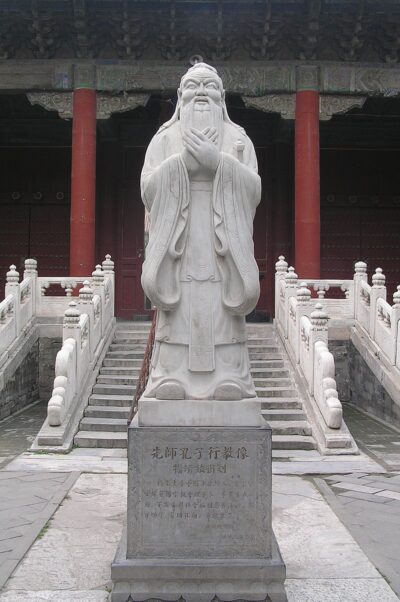
The Statue of Confucius
孔子の逸話とその教えの現代的意義
孔子は中国の思想家であり、儒家の始祖として知られています。
彼が生まれた魯国では、周末の時代に位置づけられ、その生涯は多くの逸話に彩られています。
『論語』や『春秋』などの著作を通じて、彼の思想は後世に大きな影響を与えました。
四聖人の一人として尊敬され、74歳でこの世を去った孔子ですが、彼の教えは現代においてもその価値を失っていません。
諸子百家の中でも際立つ存在である彼の思想は、人としての道を追求することの大切さを説いています。
諸国巡遊の旅を経て得た知識と経験は、彼の教えを深め、多くの人々に影響を与え続けています。
孔子の逸話は、ただの話として終わるのではなく、現代社会においても私たちが学び、実践すべき教えを含んでいるのです。
孔子の逸話:人間性と教育への洞察
孔子は紀元前551年、今の中国山東省の魯国で生まれました。
彼は中国の思想家であり、儒家の始祖とされています。
孔子の教えは『論語』にまとめられ、後世に大きな影響を与えました。
四聖人の一人としても尊敬されています。
孔子の人生は、諸子百家の時代に位置づけられ、多くの逸話が残されています。
特に、人間性と教育に対する深い洞察は、今日でも多くの人々にとって大きな価値を持っています。
孔子は74歳で没しましたが、その死後も『春秋』をはじめとする著作を通じて、彼の思想は広く伝えられています。
諸国巡遊の旅を経て、孔子は多くの弟子を育成し、彼の教えは中国はもちろん、世界中に広まっていきました。
孔子の智慧と現代社会:儒家思想の現代的影響力
孔子は、紀元前551年に魯国で生まれ、74歳でこの世を去りました。
彼は、中国の思想家であり、儒家の始祖として知られています。
孔子の教えは、『論語』や『春秋』などの著作に収められ、後世に大きな影響を与えました。
四聖人の一人としても尊敬されています。
孔子の思想は、諸子百家の時代を生き、諸国巡遊の旅を通じて、その智慧を広めました。
彼の逸話は今日でも多くの人々に愛され、儒家思想の現代社会における影響力は計り知れません。
孔子の教えは、倫理的な生き方や人としての道を追求することの重要性を我々に教えてくれます。
孔子の逸話
人物としての孔子
孔子は、中国の歴史上最も尊敬される思想家の一人であり、その教えや逸話は今日でも広く知られている。
彼の生涯から生まれた逸話は、彼の知恵や品格を示すものである。
師を求めて
孔子は若い頃、自らの学問の向上のためにさまざまな名門の師のもとを訪れた。
しかし、彼の厳しい問いかけや志向の高さは、多くの師に受け入れられることはなかった。
それでも彼は諦めず、より深い知識を求めてさらに努力を重ねた。
「学べば必ずしも行わず、行えば必ずしも学ばず」
この有名な言葉は、孔子が弟子たちに説いたものである。
彼は単なる学問だけでなく、その知識を実践に移すことの重要性を強調した。
彼は理論と実践の両面を重んじ、知恵を身に付けた者がそれを行動に移さなければ意味がないと説いた。
「己を知り、己を治め、己を律する」
この言葉は、孔子の倫理や人間性についての考えを端的に表している。
彼は個人の内面の探求と修養を重視し、自己の欠点を認識し、それらを克服することが人間の成長に不可欠であると説いた。
学び舎での逸話
ある日、孔子は学び舎に入り、子供たちが乱暴に振る舞っているのを見て驚いた。
彼は即座に座り、子供たちに「礼を知ることの重要性」を教え始めた。彼の言葉と態度に感銘を受けた子供たちは、すぐに彼に従ったという。
結論
孔子の逸話は、彼の人間性や教えの本質を浮き彫りにする。
彼の知恵や品性は、彼の生涯を通じて様々な出来事や言葉を通じて伝えられてきた。
これらの逸話は、今日でも私たちに孔子の教えや価値観を考えさせ、学びを与えてくれる。
The Modern Significance of Confucius’ Anecdotes and Teachings
Confucius is known as a Chinese philosopher and the founder of Confucianism.
Born in the state of Lu during the Zhou dynasty, his life is colored by numerous anecdotes.
Through works like the Analects and the Spring and Autumn Annals, his philosophy has had a lasting impact.
Respected as one of the Four Sages, Confucius passed away at the age of 74, yet his teachings retain their value in modern times.
Among the Hundred Schools of Thought, his philosophy stands out, emphasizing the importance of pursuing the path of humanity.
The knowledge and experiences gained from his travels to various states deepened his teachings, continuing to influence many.
Confucius’ anecdotes are not mere stories but contain teachings that we should learn from and practice in today’s society.
Confucius’ Anecdotes: Insights into Humanity and Education
Confucius was born in 551 BC in the state of Lu, present-day Shandong Province, China.
He is revered as a Chinese philosopher and considered the founder of Confucianism.
His teachings, compiled in the Analects, had a profound influence on later generations.
Respected as one of the Four Sages, Confucius’ life is situated within the Era of the Hundred Schools of Thought, leaving behind many anecdotes.
Particularly, his deep insights into humanity and education hold significant value for many people even today.
Although Confucius passed away at the age of 74, his teachings, including works like the Spring and Autumn Annals, continue to be widely transmitted.
Through his travels to various states, Confucius nurtured many disciples, and his teachings spread not only across China but also throughout the world.
Confucius’ Wisdom and Contemporary Society: The Modern Influence of Confucian Thought
Confucius was born in 551 BC in the state of Lu and passed away at the age of 74.
He is known as a Chinese philosopher and revered as the founder of Confucianism.
His teachings, recorded in works such as the Analects and the Spring and Autumn Annals, had a profound impact on later generations.
Respected as one of the Four Sages, Confucius’ philosophy thrived during the Era of the Hundred Schools of Thought and was further enriched through his travels.
His anecdotes are cherished by many even today, and the influence of Confucian thought in modern society is immeasurable.
Confucius’ teachings remind us of the importance of ethical living and the pursuit of the path of humanity.
Confucius’ Anecdotes
The Persona of Confucius
Confucius is one of the most respected philosophers in Chinese history, and his teachings and anecdotes are widely known today.
The anecdotes from his life illustrate his wisdom and character.
Seeking Teachers
In his youth, Confucius visited various prestigious teachers in pursuit of advancing his studies.
However, his rigorous inquiries and high aspirations were not readily accepted by many teachers.
Nevertheless, he persevered in his quest for deeper knowledge through continued effort.
“To learn and then practice what you have learned is not that far apart; to practice and then learn what you have practiced is not that far apart.”
This famous saying was imparted by Confucius to his disciples.
He emphasized not only the acquisition of knowledge but also the importance of applying that knowledge in practice.
He valued both theory and practice, teaching that wisdom acquired without action holds no meaning.
“Know thyself, govern thyself, discipline thyself.”
This phrase succinctly expresses Confucius’ thoughts on ethics and human nature.
He emphasized the importance of introspection and self-cultivation, recognizing one’s shortcomings, and striving to overcome them as essential for personal growth.
An Anecdote from the School
One day, Confucius entered a school and was surprised to see children behaving rudely.
He immediately sat down and began teaching them the importance of etiquette.
Impressed by his words and demeanor, the children quickly followed his guidance.
Conclusion
Confucius’ anecdotes reveal the essence of his character and teachings.
His wisdom and integrity have been conveyed through various events and words throughout his life.
These anecdotes continue to prompt us to contemplate Confucius’ teachings and values, providing us with valuable lessons even today.
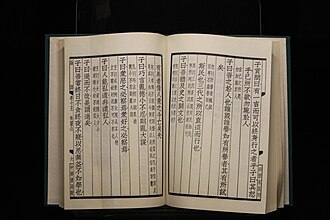
The Analects: Duke Ling of Wei
孔子の死とその遺産
孔子は、紀元前551年に魯国に生まれた中国の偉大な思想家です。
彼は儒家の始祖として知られ、その教えは後世に大きな影響を与えました。
「四聖人」の一人とされ、彼の思想は「諸子百家」の中でも際立っています。
孔子は生涯を通じて、人々に道徳と倫理を説き、『論語』と『春秋』を残しました。
これらの作品は、彼の教えや思想を伝える重要な資料となっています。
孔子は74歳でこの世を去りましたが、その死後も彼の思想は数多くの逸話とともに語り継がれています。
諸国巡遊の旅を経て、彼が築いた学問の基盤は、後の世に大きな遺産として残されました。
孔子の晩年と74歳での没
孔子は、中国の思想家であり儒家の始祖として知られています。
魯国に生まれ、生涯を通じて「諸子百家」の一人として、その思想や教えが後世に大きな影響を与えました。
特に『論語』や『春秋』は、彼の思想を伝える重要な文献とされています。
孔子は諸国巡遊の旅を経て、74歳でこの世を去りました。
その晩年は、周末の時代の混乱を憂い、理想の社会を築くために奔走した時期でした。
四聖人(四聖)の一人として尊敬される孔子の逸話は、今も多くの人々に語り継がれています。
彼の死後、儒家思想は中国のみならず東アジア全域に広がり、深い影響を与え続けています。
孔子の遺産と儒教の発展:後世への影響
孔子は中国の思想家であり、儒家の始祖として知られています。
魯国に生まれた彼は、周末期の混乱を見て、社会の秩序を取り戻すことを願いました。
そのために彼が提唱したのが、礼儀や仁愛などを核とする儒教の教えです。『論語』や『春秋』などの著作を通じて、彼の思想は後世に大きな影響を与えました。
四聖人(四聖)の一人として崇められ、諸子百家の中でも特に重んじられる彼の教えは、政治や教育など様々な分野で活かされてきました。
74歳で没した後も、彼の逸話は人々に語り継がれ、儒教は中国だけでなく、東アジア全域に広がる思想となりました。
孔子とその遺産は、今日においても多くの人々にとって尊敬と学びの対象であり続けています。
『論語』の内容
孔子の言行録
『論語』は、儒家の祖である孔子の言行録であり、彼の教えや思想が詳細に記されている。
この書は、孔子の弟子たちによって編纂され、後世に伝えられた。
弟子たちとの対話
『論語』には、孔子と彼の弟子たちとの対話が多く含まれている。
彼らの間で交わされた問答や議論は、孔子の教えや価値観を深く理解する手がかりとなる。
彼の弟子たちは彼の教えを吸収し、それを実践することで、人間としての成長を果たしていった。
仁と礼の重要性
『論語』の中で、孔子は仁や礼についての重要性を強調している。
彼は仁を人間関係の基本的な原則と見なし、礼を社会的な秩序や倫理の基盤として位置づけた。
彼の教えは、他者への思いやりや尊重、そして適切な行動の重要性を強調している。
君子の理想像
『論語』には、君子としての理想像も描かれている。
孔子は、君子とは徳の高い人であり、学問や道徳に努める者であると定義した。
彼は君子の態度や行動を通じて、理想的な人間像を示し、それを追求することの重要性を訴えた。
政治や教育への考え
孔子の『論語』には、政治や教育に関する多くの教訓も含まれている。
彼は理想的な政治体制や教育の在り方について議論し、善政と教育の重要性を強調した。
彼の考えは、中国の政治思想や教育制度に深く影響を与えた。
結論
『論語』は、孔子の思想や教えを体系的にまとめた重要な文献である。
彼の言葉や行動からは、彼の人間性や理念が如実に表れており、今日でも多くの人々に影響を与え続けている。
この書は、中国の歴史や文化における重要な遺産であり、その価値は計り知れない。
The Death of Confucius and His Legacy
Confucius, born in 551 BC in the state of Lu in China, was a great philosopher known as the founder of Confucianism.
Throughout his life, he profoundly influenced subsequent generations with his teachings, which are encapsulated in works such as the Analects and the Spring and Autumn Annals.
Respected as one of the “Four Sages,” his philosophy stands out among the diverse schools of thought in ancient China.
Despite passing away at the age of 74, Confucius’ teachings continue to be revered for their enduring value.
His extensive travels across various states during his lifetime enriched his knowledge and left a significant intellectual legacy that continues to influence many people.
Confucius’ Final Years and Passing at Age 74
Confucius, known as a philosopher and the founder of Confucianism, was born in the state of Lu in China.
Throughout his life, he profoundly influenced subsequent generations with his teachings and writings, including the Analects and the Spring and Autumn Annals.
After traveling through various states, Confucius passed away at the age of 74.
His later years were marked by efforts to restore order during the turbulent times of the Spring and Autumn Period.
Regarded as one of the “Four Sages,” Confucius’ anecdotes are still passed down through generations, and his teachings have continued to have a profound impact, not only in China but also across East Asia.
Confucius’ Legacy and the Development of Confucianism: Impact on Later Generations
Confucius is known as a Chinese philosopher and the founder of Confucianism.
Born in the state of Lu, he witnessed the turmoil of the Spring and Autumn Period and sought to restore social order.
His teachings, which emphasized rituals and benevolence, were recorded in works such as the Analects and the Spring and Autumn Annals, greatly influencing later generations.
Respected as one of the “Four Sages,” his teachings have been revered within the various schools of thought and have had a significant impact on politics, education, and ethics.
Despite passing away at the age of 74, his anecdotes continue to be recounted, and Confucianism has become a pervasive philosophy across East Asia.
Confucius and His Legacy: Insights from the Analects
The Analects: A Compilation of Confucius’ Teachings
The Analects is a record of the words and deeds of Confucius, the founder of Confucianism, and it provides detailed insights into his teachings and philosophy.
Compiled by his disciples, it serves as a key text for understanding Confucian thought and values.
Dialogues with His Disciples
The Analects contains numerous dialogues between Confucius and his disciples.
These exchanges provide profound insights into Confucius’ teachings and values, illustrating how his disciples absorbed his teachings and applied them in their lives.
Emphasis on Benevolence and Rituals
In the Analects, Confucius emphasizes the importance of benevolence (ren) and rituals (li).
He viewed benevolence as a fundamental principle in human relationships and considered rituals essential for maintaining social order and ethical conduct.
Ideal of the Junzi (Gentleman)
The Analects also depicts the ideal of the junzi, or gentleman.
Confucius defined the junzi as a person of high moral character who strives for learning and virtue.
Through the junzi’s attitude and behavior, Confucius conveyed an ideal human image and stressed the importance of aspiring toward this ideal.
Thoughts on Politics and Education
Confucius’ Analects contain many teachings on politics and education.
He discussed the ideal political system and the significance of education, emphasizing the importance of good governance and education in society.
His ideas profoundly influenced Chinese political thought and educational practices.
Conclusion
The Analects is a crucial document that systematically presents Confucius’ teachings and thoughts.
Through his words and actions, Confucius’ character and ideals are vividly portrayed, continuing to impact people’s lives today.
This work represents a significant cultural and historical heritage of China, the value of which cannot be overstated.

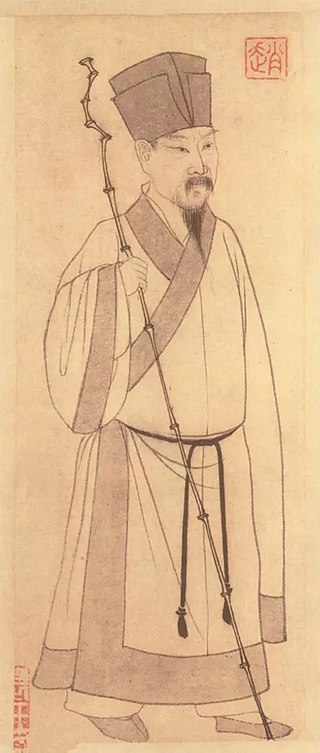
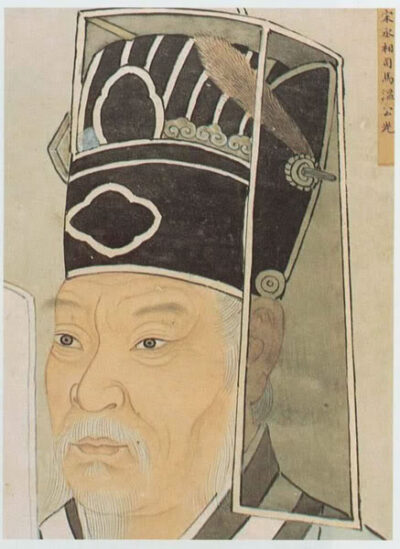
Warning: Undefined variable $comment_form_sns_tags in /home/ktsky/philosophy-kayak.com/public_html/wp-content/themes/shaper/comments.php on line 27